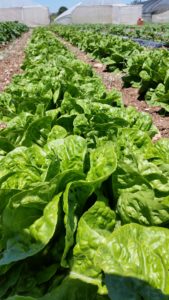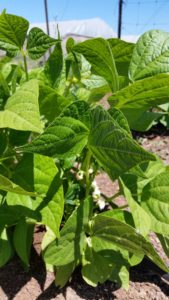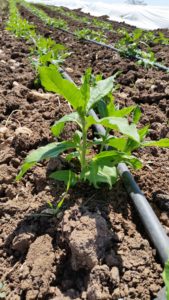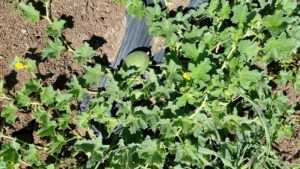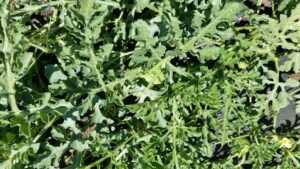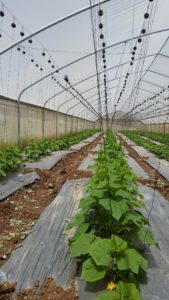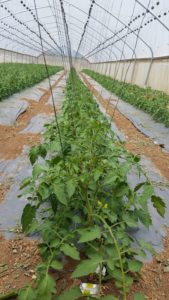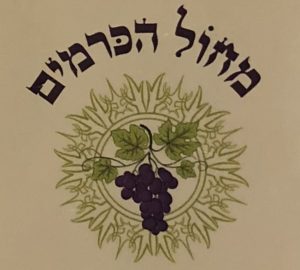
Machol HaKramim’s (The Dance of the Vineyards) famed grape juice is back! After a long break, we have replenished this natural grape juice delight, squeezed from red and green grapes from the vineyards of the Zichron Yaakov region. Order today via our order system!
____________________________________
An instant occurs midst Adar and Nissan When joy in abundance will cling Exploding with life, drunk with fragrance Oh, the healing that nature can bring. It’s thrilled and alight, flinging sparks all about But soon wilts yellow with grief As summer sets flame in its sidelines, impatient – Spring here is fleetingly brief
-David Grossman
Thanks to the rainy winter, this year’s spring stayed just a tad longer. Only last week we were enjoying cooler days, and outdoors we still catch glimpses of beautiful blossoms in their purple, blue, orange, pink, red, yellow, and white array. The plants are still slurping rainwater stored deep in the earth, but are hastening to do some last-minute blossoming so as to not miss out on the slightest window of opportunity to create seeds for next year. However… this week the weather has already begun its ascent to higher temperatures, plunging us into very, very hot days.
The late cool weather prompted us to plant one last round of cabbage and cauliflower which you have been receiving over the past few weeks (usually cauliflower and broccoli harvests end by April, maximum). However, this season the brassicaes resemble Europeans tourists in the Middle-East over the summer: somewhat stunned and out of their natural season. The vegetables are braving the heat, especially because they know this is the end, and next time we meet will be in the coolness of autumn. But they are smaller and sometimes even take on a purpulish hue. Do give them some respect for surviving, and use this opportunity to bid your farewells till the end of fall…
Our field is quickly becoming summery – the carrots, fennel, kohlrabi, celeriac, the radish family and turnips, peas and fava beans have completed their winter stay in the field, taking a break till next fall or winter. The last beds of leaf celery, parsley roots and beets are hanging in there, but by the end of the month we will say goodbye to them too. In the open field, their places are being taken by New Zealand spinach – the summer-durable green – squash and zucchini in a range of forms and colors, pumpkins of various varieties, melons, watermelons, fakkus, green beans, okra and black-eyed peas, eggplant, peppers, cherry tomatoes, corn, and spring potatoes. And this very week we planted sweet potatoes!
In our growth houses (where now that summer’s arrived we removed the plastic sheet coverings, replacing them with thin-mesh netting topped by shade nets), we planted tomatoes, cucumbers and peppers. These crops need special protection from threatening outdoor pests. In the end, these varmints manage to permeate the growth houses as well, which is why over the past few years we have been growing these crops primarily in net houses where they are protected from the outdoor world. We grow peppers there in addition to growing them in the field, and among the tomatoes – the more durable cherry tomatoes receive their own space in the open field, while their older and more sensitive sisters – the bigger tomatoes – are planted in the safety of the growth houses.
Last week we finished constructing two new growth houses at the edge of the field, serving two roles: accommodations for veggies and a ‘fence’ dividing our field and the neighboring one. Last year, the Ministry of Agriculture changed its regulations with new rules renouncing mutual agreements amongst farmers, and thus – after 15 years of cooperating with our neighbor farmer, both respecting our written agreement regarding rules of fertilization in the vicinity of our farm (us by ‘giving up’ some beds at the edges in order to create a distance from the spraying, and he by making sure to spray low on windless days and far from us). The new rules demand erecting fences between fields, separating them completely from each other. So welcome, mabruk, and may you grow well.
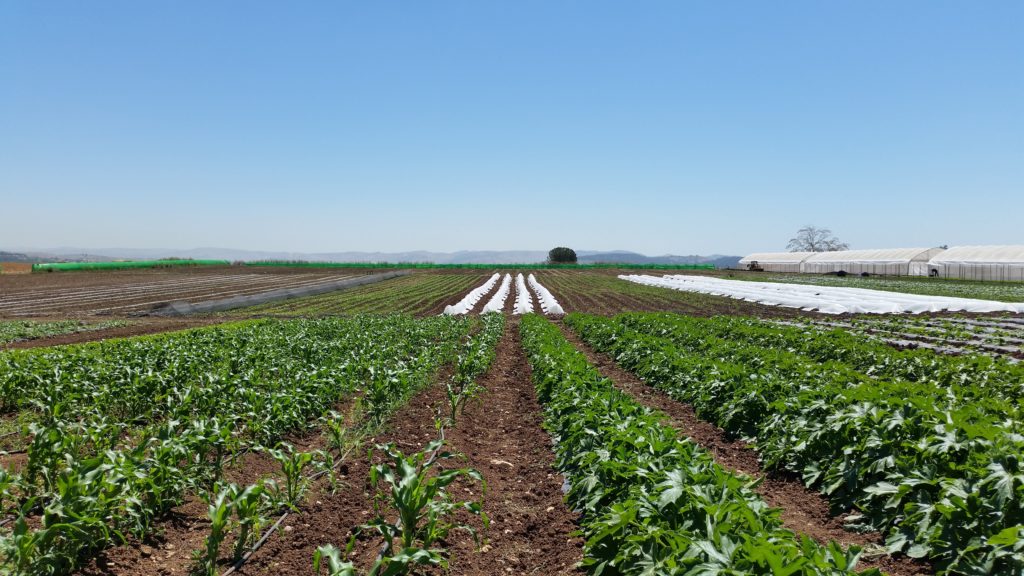
Our springtime field and in the distance – to the right – our new growth houses.
After many months of an unused irrigation system that stared raptly at the bountiful rain washing the plants and penetrating the earth to quench its thirst, we have resumed the irrigation system’s operation. Thus, the plants now receive their necessary doses of water (increasing as the temperatures rise) from the tiny drips spread along the pipes. In order to decrease the evaporation of this crucial water, some of the beds are covered in dark plastic sheets (produced from corn starch, biodegrading at the end of the season) which keeps them moist and prevents an ‘escape’ of the water into air. We will cover some of the more sensitive crops such as herbs and greens with shade nets to ease the oppressive heat lurking on the sidelines and planning its arrival.
The month of Ramadan began last week, corresponding with the beginning of Iyar, and Mohammad, Majdi and Ali now fast throughout the day during all the daylight hours. Though their days in the field are shorter and they attempt to take care of themselves by working in the packing house and avoiding the scorching sun, the burden of the fast on farmers is still not a light one. We hope – together with them – that the transition to summer will be mild – at least till the fast reaches its end. And we take this opportunity to thank the rest of our workers – most of them from Thailand – who are taking extra tasks upon themselves over this month.
Wishing you all a quiet week and a gradual acclimation to the heat. Ramadan Kareem to all who are fasting.
Alon, Bat Ami, Dror, Yochai and the entire Chubeza team
___________________________________________________
WHAT’S IN THIS WEEK’S BOXES?
Monday: Zucchini, carrots, lettuce, beets, cucumbers, tomatoes, potatoes, leeks/onions, celery, kale/New Zealand spinach, coriander/dill/ parsley
Large box, in addition: Cabbage/cauliflower, Swiss chard, garlic/ parsley root.
FRUIT BOXES: Bananas, apples, shesek (loquats), nectarines.
Wednesday: Zucchini, carrots/beets, lettuce, cucumbers, tomatoes, potatoes, leeks/onions, celery/parsley root, Swiss chard/New Zealand spinach, coriander/dill/parsley, melon/cherry tomatoes.
Large box, in addition: Cabbage/cauliflower, kale, garlic.
FRUIT BOXES: Bananas, apples, shesek (loquats), nectarines/peaches.

